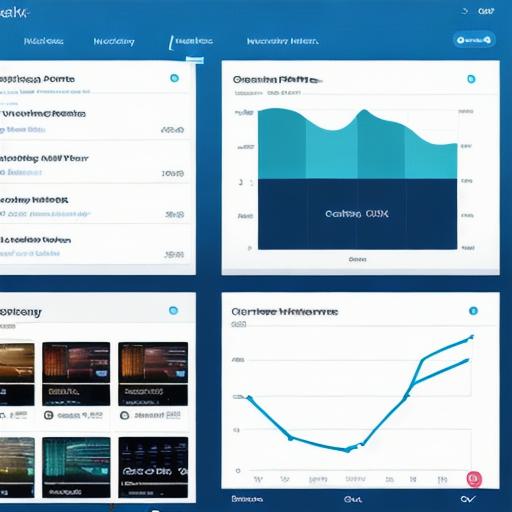Introduction
Market research is an essential part of any business strategy. It involves gathering and analyzing data about your target market, customers, competitors, and industry trends to make informed decisions that drive growth and profitability. In today’s fast-paced business environment, companies need to be agile and adaptable to stay ahead of the curve. That’s where market research tools come in handy.
There are a plethora of market research tools available in the market, each with its unique strengths and weaknesses. In this comprehensive guide, we will explore some of the most popular and effective market research tools that businesses can use to gain valuable insights into their target markets. We’ll also delve into how these tools can be used effectively to optimize marketing strategies and drive business growth.
Survey Tools
Survey tools are a popular choice for businesses looking to gather data from their customers and target audience. These tools allow businesses to create customized surveys that can be distributed online or offline, depending on the needs of the research.
Some popular survey tools include:
- Google Forms: A free, easy-to-use tool that allows businesses to create surveys and collect data from respondents.
- SurveyMonkey: A cloud-based platform that offers a range of features for creating and distributing surveys.
- Typeform: A user-friendly tool that allows businesses to create forms and surveys with customized branding and design.
- Zoho Forms: A powerful survey tool that integrates seamlessly with other Zoho applications, such as CRM and Projects.
Case Study: Using
Survey Tools
to Gather Customer Feedback
Let’s take a look at an example of how a business can use survey tools to gather valuable customer feedback. Suppose you own a restaurant that serves Italian cuisine in a busy downtown area. You want to improve your menu and service to attract more customers.
You decide to create a survey using Google Forms that asks questions such as:
- What kind of Italian dish do you like best?
- How satisfied were you with the quality of the food and service?
- Would you recommend our restaurant to your friends and family?
After distributing the survey to 100 customers, you receive 80 responses. The results show that your most popular dish is pasta carbonara, and customers are generally satisfied with the quality of the food and service. However, only 60% of respondents said they would recommend your restaurant to their friends and family.
Based on this feedback, you decide to add a new pasta dish to your menu and invest in additional staff training to improve customer service. You also create a loyalty program to incentivize customers to come back and share their experiences with others.
Social Media Listening Tools
Social media listening tools are used to monitor and analyze social media conversations about a brand, product, or industry. These tools allow businesses to track mentions of their brand on social media platforms such as Twitter, Facebook, Instagram, and LinkedIn. They can also be used to monitor competitors’ activities and identify emerging trends in the market.
Some popular social media listening tools include:
- Hootsuite Insights: A powerful tool that allows businesses to monitor social media conversations, track brand sentiment, and analyze customer feedback.
- Sprout Social: A comprehensive platform that offers features for social media management, analytics, and listening.
- Mention: An easy-to-use tool that allows businesses to monitor social media conversations, track mentions of their brand, and analyze customer sentiment.
- Brandwatch: A sophisticated tool that provides advanced social media listening capabilities, including AI-powered sentiment analysis.
Case Study: Using
Social Media Listening Tools
to Monitor Competitors
Let’s take a look at an example of how a business can use social media listening tools to monitor its competitors. Suppose you own a coffee shop in a busy downtown area and want to stay ahead of the competition.
You decide to use Hootsuite Insights to monitor social media conversations about coffee shops in your area. You set up alerts for mentions of your brand, competitors, and relevant keywords such as "coffee," "espresso," and "latte."
Over the course of a week, you monitor 100,000 social media conversations about coffee shops in your area. You find that customers frequently mention your shop’s great customer service and coffee quality, while also expressing dissatisfaction with the long wait times at some competitors.
Based on this feedback, you decide to invest in additional staff training to improve wait times and expand your seating capacity. You also create a loyalty program to incentivize customers to come back and share their experiences with others.

Online Focus Groups and Webinars
Online focus groups and webinars are virtual tools that allow businesses to gather feedback from a group of people in real-time. These tools are particularly useful for businesses looking to conduct market research on a tight budget or without physically bringing participants together.
Some popular online focus group and webinar tools include:
- Zoom: A cloud-based platform that offers features for video conferencing, screen sharing, and recording.
- GoToWebinar: A comprehensive platform that allows businesses to host webinars, online focus groups, and other virtual events.
- Skype: A free, easy-to-use tool for conducting video interviews and focus groups.
- Google Meet: A powerful platform for hosting virtual meetings, including focus groups and webinars.
Case Study: Using Online Focus Groups to Test New Products
Let’s take a look at an example of how a business can use online focus groups to test new products. Suppose you own a technology company that wants to launch a new line of smartphones in the market.
You decide to conduct an online focus group using Zoom to gather feedback from potential customers. You invite 20 participants and provide them with a sample phone to test for a week. You also ask them to complete a survey at the end of the testing period to provide additional feedback.
After the testing period, you receive feedback from the participants about their experiences with the phone, including its features, user interface, and performance. You use this feedback to make improvements to the phone design and features before launching it in the market.
Customer Relationship Management (CRM) Tools
CRM tools are used by businesses to manage customer interactions across various channels, including email, social media, and in-person meetings. These tools allow businesses to store and analyze customer data, track customer behavior, and personalize marketing messages.
A PLACE FOR A PICTURE #2
Some popular CRM tools include:
- Salesforce: A powerful CRM platform that offers features for sales automation, marketing automation, and customer service.
- HubSpot: An all-in-one marketing, sales, and service platform that includes CRM capabilities.
- Pipedrive: A user-friendly CRM tool that’s particularly suitable for small businesses.
- Zoho CRM: A cloud-based CRM platform that integrates seamlessly with other Zoho applications, such as project management and accounting.
Case Study: Using CRM Tools to Personalize Marketing Messages
Let’s take a look at an example of how a business can use CRM tools to personalize marketing messages. Suppose you own an e-commerce store that sells handmade jewelry. You want to create targeted email campaigns to increase sales and customer engagement.
You decide to use HubSpot to manage your email marketing campaigns and track customer data. You segment your email list based on customer behavior, including purchase history, browsing history, and location.
Using this data, you create personalized email campaigns that offer discounts or promotions to customers who have previously purchased from your store. You also include product recommendations based on their browsing history.
After the campaign, you track open and click-through rates and use this feedback to optimize future campaigns. As a result, you see a significant increase in sales and customer engagement.
Conclusion
Market research is essential for businesses looking to make informed decisions about product development, marketing strategies, and competitive positioning. By using the right tools and techniques, businesses can gather valuable insights from customers, competitors, and industry experts. Whether it’s through online focus groups, social media listening, or CRM platforms, market research can help businesses stay ahead of the competition and achieve long-term success.




